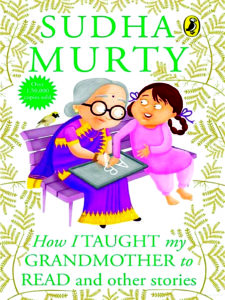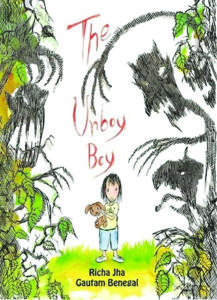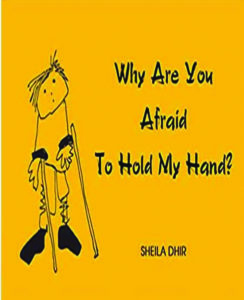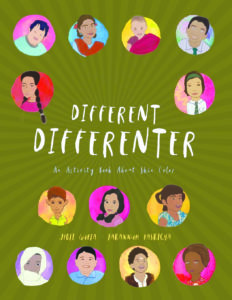By Pritisha Borthakur
We may learn so much through books, and they can also widen our horizons and introduce us to new ideas. They have a method of evoking empathy in readers by allowing them to empathise with characters that may be unlike themselves or with other characters in the novel. One of the finest ways to approach such weighty and complicated themes is through children’s books that celebrate variety. Representation is important. People will always wonder things like “do I belong here?” until society truly reflects everyone. Thankfully, there are now an increasing number of multicultural children’s books that address issues of race, religion, inclusion, tolerance, and empathy.
Consider these five excellent reads by Indian authors that celebrate diversity and are a great way to teach your loved ones the beauty of our multicoloured and multicultural globe!
 How I Taught My Grandmother to Read?
How I Taught My Grandmother to Read?
(By Sudha Murthy)
Sudha Murty being an author, teacher and a social worker comes across with many people with different way of thinking and unique mindsets. This book consists of short stories where Sudha Murty recounts her real-life incidences. What do you do when your grandmother asks you to teach her the alphabet? ‘How I Taught My Grandmother to Read’ has all the experiences, life values, and learnings which a person should have at any age. Through this book the author tells the readers that learning has no age bar, there is always a start at any age, and that nothing is impossible. Funny, spirited and inspiring, the story teaches a valuable lesson about the importance of doing what you believe is right and having the courage to realise your dreams. Author Murthy writes in the simplest of languages, yet each word tugs at your conscience. It is apt for 8 years and above.
Puhor and Niyor’s Mural of Family Stories
(By Pritisha Borthakur)
‘Puhor and Niyor’s Mural of Family Stories’, written by a journalist and mother, Pritisha Borthakur, is a powerful progressive children’s book that aims to inspire curiosity, raise awareness, instill compassion, entertain, and show a unique glimpse of the diverse kinds of families found in any community. The book begins with an introduction to Puhor and Niyor, two brothers making a mural, telling the stories of different families. It shows Puhor and Niyor’s family as being a nuclear family, with a mom and a dad. These twins demonstrate there are all sorts of families – children with two moms, two dads, a single mother; a multiracial family unit; foster and adopted children; pet parent and more – none more important than another, and all of them are beautiful in their own unique way. The story progresses with adding to the mural an illustration of each unique story. In the end, the small community, made up of various kinds of unique families, teach each other about different types of people every day, and to not judge others based on their race, gender, sexual identity, disability, or anything else. They embrace their differences and paint a beautifully coloured mural, as beautiful and colourful as the community itself.
 The Unboy Boy
The Unboy Boy
(By Richa Jha)
‘The Unboy Boy’ is a gentle story of Gagan who is at ease being what he is. And he has enough tricks up his sleeve to show the world that there are no boy boys or un-boy boys. Just boys. And just girls. Every child has a right to embrace who they are, no matter where they may lie on the spectrum of gender. Richa Jha’s tale deconstructs this idea of gendered expectations, and emphasises on the right of every child to be who they are, and to be loved in their entirety. No more, no less. Unusual and heart-warming, this book is a must read for any young child who is trying to find their feet in a complicated and prejudiced world, and need to learn how to love and accept themselves no matter what anyone else may say.
 Why Are You Afraid to Hold My Hand?
Why Are You Afraid to Hold My Hand?
(By Sheila Dhir)
Most people are confused about how to react to those with disabilities. Their questions, misconceptions, doubts and fears are answered here – simply and straight from the heart – by a child with cerebral palsy. The child responds in verse – simple and straight from the heart. Sheila Dhir’s childlike line drawings are just as simple and powerful as the short verses. As a differently-abled child’s dialogue with society, the book offers a sensitive and sensible way of helping children understand disability, and the strengths of those who are differently abled. Apt for 6 years and above.
Different Differenter
(By Jyoti Gupta)
 This is an activity book for children that thoughtfully addresses everyday skin color consciousness and bias in a way that’s easy to understand. Children’s rich observations and questions about colour, caste, and race elicit accurate yet straightforward responses. Jyoti Gupta’s art-and-craft-based book takes you on a playful and creative discovery to find answers that work for you and your family–while creatively introducing facts of history and 15-plus new words. It’s a beautifully-illustrated, educational tool that sets the context for hard conversations about self-awareness, color, and identity. Subjects in the book include biology of skin (e.g. melanin); culturally-related aspects (e.g. food); colourism’s social impact (e.g. bullying) and solutions (e.g. bystander intervention). (IANSlife)
This is an activity book for children that thoughtfully addresses everyday skin color consciousness and bias in a way that’s easy to understand. Children’s rich observations and questions about colour, caste, and race elicit accurate yet straightforward responses. Jyoti Gupta’s art-and-craft-based book takes you on a playful and creative discovery to find answers that work for you and your family–while creatively introducing facts of history and 15-plus new words. It’s a beautifully-illustrated, educational tool that sets the context for hard conversations about self-awareness, color, and identity. Subjects in the book include biology of skin (e.g. melanin); culturally-related aspects (e.g. food); colourism’s social impact (e.g. bullying) and solutions (e.g. bystander intervention). (IANSlife)



